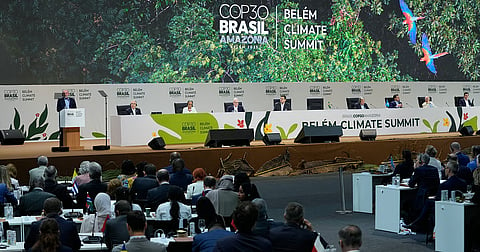
- Home
- Live Blog
- Breaking News
- Top Headlines
- Cities
- NE News
- Sentinel Media
- Sports
- Education
- Jobs

A CORRESPONDENT
JORHAT: The North-East Affected Area Development Society (NEADS) has joined the global community at the 30th United Nations Climate Change Conference (COP30) which begins on Monday in Belem, Brazil. NEADS is a grassroots development organization working on sustainable environment and climate action at the local level, based in Jorhat, Assam.
The two-week summit, being held from 10 to 21 November, brings together world leaders, scientists, civil society groups, and community organizations to deliberate on urgent actions to address the escalating climate crisis. NEADS participation marks an important milestone for the north-east region of India, one of the most climate-vulnerable regions in the world. Representing NEADS at COP-30, Tirtha Prasad Saikia, the organization’s Director, said, “It is an honour to bring the voices of Assam’s flood-affected and climate-vulnerable communities to a global platform. Our participation is a step toward ensuring that the experiences, losses, and resilience of our people are recognized in the global climate agenda.”
With climate justice, adaptation, loss and damage, and community inclusion at the heart of this year’s COP, NEADS aims to share its grassroots experiences in promoting climate-resilient farming, disaster preparedness and community-driven adaptation. The organization also advocates for the recognition and integration of Local, Indigenous, and Traditional Knowledge (LITK) in building resilience and shaping climate responses in risk-prone areas like Assam.
At COP-30, NEADS is expected to engage in discussions, side events, and policy dialogues highlighting the intersection of climate change, human development and justice in India’s north-east. The conference, being hosted for the first time in the Amazonian city of Belem, also emphasises the shared struggles of communities in the Global South from the floodplains of Assam to the forests of the Amazon.
“Our message is clear: adaptation must begin at the grassroots and communities on the frontline must be at the centre of all climate action. Recognizing loss and damage and valuing Local and Indigenous Knowledge systems are essential for achieving real climate justice,” Saikia added.
Also Read: 15 foreign delegates join art event on climate change at Baksa Hill